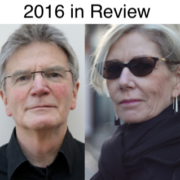Aziz Choudry & Salim Vally
Radical histories and social movements
Today we look at the lessons that can be learned from radical histories. My guests are Aziz Choudry and Salim Vally. They’ve edited a new volume entitled: Reflections on Knowledge, Learning and Social Movements: History’s Schools (Routledge, 2018).
They see history as an organizing tool and discuss the ways in which social movements have learned from the past.
Aziz Choudry is Associate Professor and Canada Research Chair in Social Movement Learning and Knowledge Production in the Department of Integrated Studies in Education at McGill University and a Visiting Professor at the Centre for Education Rights and Transformation, University of Johannesburg. Salim Vally is the Director of the Centre for Education Rights and Transformation, an Associate Professor at the Faculty of Education, University of Johannesburg, and a Visiting Professor at the Nelson Mandela University. They are both active in various social movements and solidarity organizations around the world.
Citation: Choudry, Aziz, & Valley, Salim, interview with Will Brehm, FreshEd, 115, podcast audio, May 7, 2018. https://freshedpodcast.com/azizchoudry-salimvally/
Will Brehm 1:43
Aziz Choudry and Salim Vally, welcome to FreshEd.
Aziz Choudry 1:46
Thanks, Will.
Salim Vally 1:46
Thank you, Will.
Will Brehm 1:48
So, I wanted to start by basically paraphrasing a question that you actually raise in your new book and the question is from Paul Kramer who asked in the Chronicle of Higher Education last year: what is the use of history at a time of creeping and hard charging authoritarian politics?
Aziz Choudry 2:08
Well, one of the things that Kramer talks about is that, in the times like today, that radical historians and radical histories can disrupt senses of inevitability, and can dig out alternatives that are sometimes lost or forgotten for various reasons, and to widen the horizons of empathy. So, in our introductory chapter, we basically agree that those are really important roles that history can play both in terms, I think, of thinking through conditions that people have faced in previous generations of struggles but then also how it’s been that people have resisted and struggled. And to think about some of the relevance and engage critically with those histories for organizing and progressive thinking today.
Salim Vally 3:07
I agree. You know, Paul Kramer’s question has been very important for us to frame the book, because it is about disrupting inhabitabilities, but it’s also disrupting silences and the falsification of the past. I mean, Kramer talks about history, not as something surmounted or transcended, but what he says, and I quote is, “it has elements of a past haunted present”. So, if we look at the current distribution of power, of privilege, of wealth, these present conditions are inseparable from the past. So, look at the struggle for reparations for slavery, or the legacy of colonialism, occupation, that continues to resonate today in terms of power and privilege. I think the other issue for writing this book in a time like this is we have been inundated, both Aziz and I, by a number of young people who our role and involvement in various social movements, student organizations, immigrant workers, migrant groups of people who are seeking ways -while changing the world, approaching and understanding history- who are hungry, who are eager to learn about how people have struggled in the past, how they’ve done it. And of course, as Aziz has talked about, in doing so, envisioning alternatives as part of developing their own activism. I think those are the issues that come to mind and that Paul Kramer really assisted us.
Will Brehm 5:19
It’s interesting to think, is the role of history becoming more important today as Kramer was saying, in these times of authoritarianism in the US but also in many other parts of the world. And you’re saying that these sort of radical histories can disrupt inevitabilities and disrupt silences. But in many ways, history is always a history of forgetting. There’s always silences, even in more quote unquote, un or non-authoritarian times, right? So, is it more relevant today, or is it sort of radical history always relevant?
Aziz Choudry 5:58
Oh, I think it’s always relevant. David Featherston talks about the significance of hidden geographies and histories of solidarity. And he says that such solidarities can be powerfully shaped by working class groups and movements. And that this asserts the importance of groups that are seen as being marginal, or remembered as being marginal, in shaping practices of solidarity. And it’s a challenge to also a lot of assumptions that are made, that those who are subject to different forms of oppression lack the capacity, or interest, to construct solidarities. And I think it’s really important in an organizing context, and in a context where numerous people are saying, “Well, what do we do? How do we deal with -whether it’s the government or corporations or militarism or all of the above- how do we sort of organize? How do we resist? and so on. And I think one of the things that the sort of the dominant tellings of history have been very good at and what Gary Kinsman a sociologist in Canada talks about as being the social organization of forgetting is to kind of erase out or misremember the role of many ordinary people -people who aren’t necessarily the names in the history books and so on- who have been absolutely crucial and fundamental to building struggles for change. And so, I think, if we don’t think about that history, those processes whereby movements, struggles for change have been built through that kind of grunt work of organizing if you like, then we sort of are deprived of, in some ways, tools and perspectives on how to organize today. So, I do think that, yes, it’s important today. I think, however, that in previous struggles, too, we’ll find experiences not all struggles by any means, necessarily thinking through about, you know, previous histories of struggle. What do we learn from earlier struggles of unions, of students of workers, but there are, I think, within many struggles, those folks in those spaces where people are trying to critically engage with history, not as a sort of a collection of facts and dates, but actually is understanding history as being a process and a process that’s not only about what they do to us, so to speak, but also what we -what people organizing together- have done to fight back and to resist and to change history, in many cases.
Salim Vally 8:42
Yeah, that’s exactly right. Gary also talks about historical amnesia, and how that allows resistance and the radical roots of movements and communities to be, in a sense, displaced by dominant versions of history, more respectable liberal forms of history. That’s another important point. But I think largely, the endeavor of this book is about fashioning tools from forms and histories of resistance that are all too often forgotten and buried. And we’ve tried to unearth that.
Will Brehm 9:31
So, let’s talk about some of these tools. I mean, this is so interesting, right? This sort of struggle for historical memory, this sort of seeing history as collective memory to reference some of the studies or work where memory is not some sort of individual process and memory is, as Aziz was saying, not some collection of facts and dates, but this social process that must be struggled over and negotiated. And of course, there are some people and institutions that have a lot more power than others. And it seems like your book is trying to really go down to those who have been oppressed and repressed and are struggling against powerful states and other institutions and trying to say, “Look, there’s history here that should be remembered”. So, let’s go into some of these tools. How do certain social movements remember? How do they construct history that is alternative?
Aziz Choudry 10:29
Yeah, I think, if we look at how movements do that, there’s a multiplicity of ways. And Andrew Flynn, who’s one of the contributors to the book, who’s done some really, I think, important work both within the UK in relation to labor histories and buried community histories but more generally, I think, has made some really important contributions to thinking through, and mapping out, and documenting different ways in which ordinary people engaged in struggles have created informal archives of all kinds of things. So, what’s he talking about? He’s talking about the flyers, and the posters, and the stickers, and the badges and the publications in some cases, that existed for many of us who were organizing in the pre-internet era and since then too, have kind of, had buried in boxes and all kinds of places, plastic bags, and so on. And sort of recognizing that within those mundane-often-seeming things, if we’ve been involved in producing them, maybe they’re not things that we immediately think of as being places of intellectual work and thoughts and analysis and so on. But going back into those kinds of products and those kinds of collective and individual contributions in there too are ways that people are now thinking, Okay, do you digitize this? Do you put this on online? Do you find ways to not only just to make it more available? But also think about, how do you actually do that in a way that is relevant to new generations? It’s not just about the preserving, it’s also about how these histories are not just things to be sort of looked at, in a sort of passive way but are tools for being able to engage with political struggles. Though there are a range, I think, of people who are doing work on there, in different spaces. Anandi Ramamurthy and Kalpana Wilson. for example, in a chapter that is mainly around British-South Asian organizing in the 70s, 80s, and 90s. In the 90s, Rama Mati’s work, for example, that kind of preservation of posters and bulletins, and so on, alongside oral histories with people who were involved with the political struggles of the 70s and 80s, the anti-racist struggles in Britain, that sort of particular politics of that time, I think it’s produced some really rich work. And so, those are a couple of examples that give a sense, of perhaps the ways in which some people, and some people associated with the book project, are working on that. But then there’s also other kinds of perhaps less obvious processes about intergenerational learning that actually in some ways are more embedded in organizing and slow kind of under the radar sorts of knowledge exchange and production that’s happening cross generationally, as if you like, older and newer generations of activists are finding time to do stuff together, whatever that might be.
Salim Vally 14:17
Yeah, I mean, you know, people like Robin Kelley and Martha Biondi, for example, have chapters that deal with the Black and third world liberation politics from the 60s and that’s really important for activists in the Black Lives Matter movement for example. We also have chapters that explore the rich heritage of the South African liberation struggle, and two of the authors have been involved in hip hop groups in the 80s and that history also is documented as forms of struggle from below -knowledge from below. And in a sense, that history, those archives that have been mentioned, are absolutely imperative for contemporary organizing and activism. One other example, we have had a very vibrant student movement in South Africa, focused around the commodification of education and the need to make higher education free. So, one of the chapters written by Koni Benson, Asher Gamedze, and Akosua reflects on the kind of critical African history content as a way of helping the student movement to look at issues of curriculum and decolonization, and they’ve dug up material written by activists from the past. Material that hasn’t been stored in archives but they’ve used this material for contemporary struggles. So, the purpose is to alert people to material that exists, even though it might not be documented, and cataloged, and put into archives -but as a way of instilling the importance of this material and experiences.
Will Brehm 16:52
So, the two of you, from my understanding, have been involved in various social movements in different parts of the world for many years and decades at this point. Is there anything that you have learned by looking back at these informal archives or intergenerational learning from other social movements, or people who have participated in social movements, that have informed what you do in later social movements? Like what sort of learning have you encountered that you have done in this sort of ongoing process of social movements?
Aziz Choudry 17:29
Well, I mean, if I can talk about something that’s sort of working on now both with a union friend here and organizers in migrant and immigrant worker organizing in Canada. One of the things, I think, that has come up, again, has been, you know often there’s this talk about a sense of newness when it comes down to thinking about worker centers and organizing outside of unions, organizing, supporting un-unionized workers and so on. And there’s a lot of talk, both, I think in the activist world and in the academic world about the novelty of this. And a number of us, over the years, have talked about the fact that “no, there are precedents for this. And in fact, what we have -if we think about labor history, I’ve just finished writing a short article with Dave Bleakney from the Canadian Union of Postal Workers, which reflects our conversations and work together over many years as educators in different ways, both informally non-formally and so on- is I think a need to look back at history because the omissions of history shape very often the kind of landscape and understandings that people have about how agency, about how and who does what. And to give you an example, if you look at the radical tradition, so to speak, in Canada, it’s a multi-racial one. And yet the histories, for example of Chinese and Japanese Canadian organizing in the early part of the 20th century, a time of sort of white, exclusionary trade unionism, and the histories of other communities -who’ve often been both struggling with the state, struggling with the bosses, and struggling with the mainstream union, so to speak- if at all mentioned are often a kind of a footnote. Now, why is that important?
Well, one of the things I think that is really important in terms of, working with alliances of people in 2018, in relation to labor and immigration justice issues in Canada, is to point out that as you know, as David Featherston] said that people who are oppressed and who are marginalized economically and socially, there’s a long history of fighting back. There’s a long history also and an unacknowledged history, I think, of how that has shaped all kinds of things, in terms of whether it’s around different histories of sort of anti-racist politics. But it’s like sometimes the remembering of these struggles is kind of anecdotal and scattered around and not particularly sort of pulled together in a more systemic kind of way. And to me, I think there’s a real importance of looking now, at those histories, to really challenge for example, some of the tendencies that sometimes exists to view precarious workers -and migrant workers I’m thinking in particular- as being sort of people who need the often sort of white, Canadian savior to tell them how to organize and what their rights are. And I think it’s in those histories that kind of helped to inoculate and build up. It’s not just in those histories. It’s what we do with those histories now. The history alone isn’t enough. And I think that can be an important organizing tool. So, for me, I suppose the short answer is, I think I’ve always thought history was really important, but in a really practical sense, and in sort of seeing it as being an intrinsic tool for organizing and for sort of political education in the here and now, I think that sense has become much more sharpened over the years.
Salim Vally 21:30
For me, it’s quite clear that the hegemonic, dominant view of history is not able to provide answers. I’m confronted constantly with the question. Well, you know, 24 years after the first democratic elections in South Africa, why is the level of poverty and inequality still so high? And it’s only by looking at the struggles from below that one can get a proper sense of what happened in the past two decades. So, our six chapters on South Africa looks at the breadth and the depth of the struggles that have not really stopped. I mean, there’s an activist from SOWETO, Trevor Ngwane, who was involved and was a counselor after the democratic elections for the African National Congress, the ruling party. And his chapter is very significant, and shows what the black working class communities in South Africa went through and why in a sense, there hasn’t been the kind of meaningful change that everybody expects. There’s also, separately, the role of women in struggle has been ignored or underplayed and one of the chapters in our collection deals with the important vital role of women in struggle. Otherwise, the hegemonic view is a big man and elides the struggles from below and the role of women. So, for me, I think this encounter with different individuals involved in collective struggle, and their rich experiences allows one to make sense of the present.
Will Brehm 23:50
Are there any examples of moments when the dominant version of history changed or altered because of these histories from below, because of these militant histories, these radical historians? Are there any good examples that show the power that history as an organizing tool can actually have on reshaping the dominant history?
Salim Vally 24:15
Well, I think we stopped the book by looking at the life and the work of Walter Rodney. He was somebody whose political activism, the popular education he was involved with, his organizing, and in fact, his study of history made a very significant impact on the way people see history. I’m thinking of, particularly his, How Europe Underdeveloped Africa, and it’s a seminal work and it captures the struggles from below but it also influenced a generation of thinking about development and colonialism and the need for struggle and resistance differently.
Aziz Choudry 25:13
I mean, I think to pick up on that as well. You know, if we look at different struggles around the world that have been anti-colonial struggles, that sense of history and holding on to a history that isn’t the colonizers’ history is a theme that comes through, not only in the book, but you know, in many struggles. In the book, Irene Watson and Sharon Venne, who are two indigenous women, both happen to be lawyers. Both of those people in the book and separately, I think, have done an enormous amount of work to keep putting forward over decades in the face of Australian, and Canadian, and New Zealand, and US, and other governments’ official histories that “No! Indigenous peoples did not cede sovereignty when the Europeans came and planted flags and so on”. And have, in the work that they’ve done, I think always had this very strong assertion of a history that is not -to quote, Buffy Sainte Marie, who’s a Cree singer songwriter, she talks about, you know, history being written in a liar’s scrawl. Folks, like, many indigenous scholars, activists, I think that history has been an anti-colonial and an indigenous history has been one that, in spite of all of the things that governments and businesses have thrown at them, have really worked and figured out ways to document, and write, and act back to those official archives, those official history. So, in the book, the chapter that they write together looks at and exposes a history of international efforts by indigenous peoples at the United Nations, which isn’t the sort of version that often we might read from governments, or UN agencies, or nongovernmental organizations, for example. And I think that history coupled with -again, I don’t think it’s history alone, I think it’s how people use history in the daily work of organizing an education that is often so key to this sort of sense of pushing through and nurturing a sense of histories from below as some people talk about them -as being essentially part of trying to build movements, and power, and collectivity to fight back and to resist.
Will Brehm 27:56
Has the role of digital media helped in this process of alternative histories or radical histories?
Aziz Choudry 28:03
I mean, I think technology is a tool like other things. And there’s certainly ways that people are using the internet and digital media platforms to try and document and make accessible different kinds of histories. But I think that again, the social aspects and the ways in which people coming together in an organizing context or being able to sort of develop and work through and think through and critically engage with history. We’re not putting forward some argument that says, isn’t all activist history and all histories of struggle great? No, I mean, part of our learning and part of the value of this is actually I think people coming together and talking through and looking perhaps with lenses or perspectives, that are very much rooted in the here and now. But recognizing and thinking about the shoulders of earlier struggles on which we all stand. So, I think it is something that is like, a lot of other things can be used as a tool. I don’t have a sort of techno utopian view that it has rapidly advanced or transformed the social processes that I think are so key to actually making sure that this kind of engagement with social movements, knowledge production, and history of struggles, and histories of what the conditions of those struggles have been facing, and so on. I don’t think it’s radically transformed in any way, you know, those sort of horizons or possibilities.
Salim Vally 30:00
You know the opening of the first chapter after the introduction, Andrew Flynn’s chapter, talks about the possibilities of using digital technology in a positive sense. And of course, we know how social media platforms can be used by activists and movements to share, preserve, engage, and educate from historical sources. But we also talk about the dangers of technology and the over reliance on the internet for research. For example, we quote Robyn Rodriquez, who makes the point that such an over-reliance can sometimes prevent people from very grassroots movements interacting with such groups. So, really, one does need to be cautious and critical of technology but we certainly understand that it has its uses.
Will Brehm 31:20
Well, Aziz Choudry and Salim Vally, thank you so much for joining FreshEd. It really is a pleasure to talk today.
Aziz Choudry 31:25
You’re welcome.
Salim Vally 31:27
Thanks very much, Will.
Coming soon.
Coming soon.









